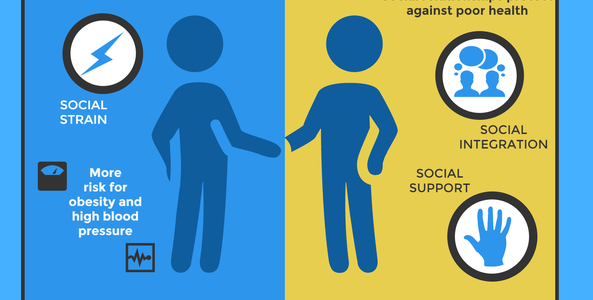Maelstrom Research at McGill University has incorporated Add Health public-use data into a searchable metadata catalogue that will facilitate the identification of constructs and measures common across longitudinal studies of aging worldwide.
Maelstrom hosts an associated harmonization platform that assists in developing ways to create commensurate measures in situations where the specific variables collected differ across different studies.
Add Health public-use data is now harmonized across all four waves and variables can be compared to other longitudinal study measures by searching the Maelstrom repository.
The Add Health study profile is available on the Maelstrom Research website:
https://www.maelstrom-research.org/mica/study/add-health
At the bottom of the page, the interaction tool allows users to browse Add Health data by standardized topics Maelstrom uses across all studies.
Click here to read the journal article
Add Health Researcher, Dr. Anna Manzoni, at North Carolina State University used Add Health data to conduct research on parental financial support and living arrangements for young adults interviewed at Wave IV. Manzoni was interested in how young adults become independent of their parents.
She looked at data on 6,471 respondents between the ages of 18 and 32 who participated in the Add Health study. She found that 41.4% of the participants who were between the ages of 25 and 32 still relied on financial support from their parents.
Additionally, respondents who attended four-year colleges and those from higher socioeconomic backgrounds were much more likely to be partially independent in their early 20’s.
While those from higher socioeconomic background tended to be more partially independent on their parents, individuals who attended college were more likely to become financially independent by their late 20’s and early 30’s.
Results from this study also suggest that full or partial independence may lead youth from lower socioeconomic backgrounds into renewed dependence on their parents later in life.
For more information on living arrangements in young adulthood for our Wave IV respondents, please see our Research Brief on this topic.
Scholarly source:
Manzoni, A. Intergenerational Financial Transfers and Young Adults’ Transitions In and Out of the Parental Home Social Currents 2329496515616822, first published on November 26, 2015 doi:10.1177/2329496515616822 Available here
The research team of Chenoa D. Allen, Clea A. McNeely, and John G. Orme examined the associations between self-rated health and four health indicators using Add Health data. These health indicators – BMI, chronic conditions, functional limitations, and depressive symptoms – were found to be consistently associated to self-rated health across adolescence and young adulthood, and self-rated health was valid across racial/ethnic groups and immigrant generations. This study addresses a critical gap in health disparities research.
Read the article in the Journal of Adolescent Health: Self-Rated Health Across Race, Ethnicity, and Immigration Status for US Adolescents and Young Adults
Authors
- Chenoa D. Allen, Department of Public Health, University of Tennessee, Knoxville
- Clea A. McNeely, Department of Public Health, University of Tennessee, Knoxville
- John G. Orme, College of Social Work, University of Tennessee, Knoxville, Tennessee
Scholarly source: Allen CD, McNeely CA, Orme JG. Self-Rated Health Across Race, Ethnicity, and Immigration Status for US Adolescents and Young Adults. Journal of Adolescent Health 2015. Article available online.
Using data from Add Health and three other studies, the research team of Y. Claire Yang, Courtney Boen, Karen Gerken, Ting Li, Kristen Schorpp, and Kathleen Mullan Harris examined the impact of social relationships over the lifecourse. The results showed that social support was related to better health from adolescence to old age, including levels of inflammation, hypertension, and obesity. Relationships were so important in adolescence that social isolation had an impact similar to a lack of exercise.
Read the story from Huffington Post: Friends Are As Important To Your Health As Diet And Exercise
Excerpt:
“We’re able to show for the first time how this link [between social relationships and health] happens, evolves and changes as individuals age,” said sociology professor Yang Claire Yang of UNC Chapel Hill and the Lineberger Comprehensive Cancer Center.
“Based on these findings, it should be as important to encourage adolescents and young adults to build broad social relationships and social skills for interacting with others as it is to eat healthy and be physically active,” said senior study author Kathleen Mullan Harris, who is also a sociology professor at UNC Chapel Hill.
Read coverage on this study from other media outlets at:
Scholarly Source: Yang YC, Boen C, Gerken K, Li T, Schorpp K, Harris KM. Social relationships and physiological determinants of longevity across the human life span. PNAS 2016. doi: 10.1073/pnas.1511085112. Article available online.
The National Longitudinal Study of Adolescent to Adult Health (Add Health) public-use data is now available for download from Dataverse. Add Health is part of UNC’s Dataverse collection , hosted by The Odum Institute. Dataverse is a “federated” system in which data are archived and preserved at multiple institutions worldwide, ensuring long-term access to the data.
If you are interested in data not available in the public-use datasets, please see our restricted-use data page for information about the contract application process.
The data file crosswalk provides a comparison of the contents of the public-use and restricted-use files.
Summary: Using Add Health data, the research team of Lauren D. Asarnow, Eleanor McGlinchey, and Allison G. Harvey found that later bedtimes for adolescents during the school week were linked to weight gain over time. More specifically, for each hour later respondents went to bed, there was a 2.1 kg/m2 increase in BMI.
Read the story from The Washington Post: Teens with late bedtimes may be more likely to gain weight over time, study says
Excerpt:
‘The results were significant even after they controlled for things like gender, race and socioeconomic status. Interestingly, sleep duration, screen time and exercise frequency didn’t seem to affect BMI over time.
“The results are important because they highlight adolescent bedtimes, not just total sleep time, as a potential target for weight management concurrently and in the transition to adulthood,” Lauren Asarnow, a doctoral candidate at the University of California at Berkeley and co-author of the study, said in a statement.’
Read coverage on this study from other media outlets at The New York Times, NY Daily News, and The Sydney Morning Herald.
Scholarly Source: Asarnow LD, McGlinchey E, Harvey AG. Evidence for a possible link between bedtime and change in body mass index. SLEEP 2015;38(10):1523–1527. doi: 10.5665/sleep.5038. Article available online.
Summary: Using network data from Add Health, the research team of Edward M. Hill, Frances E. Griffiths, and Thomas House discovered that depression is not spread among friends, and that in fact, being part of a friendship network that includes adolescents with healthy moods can both reduce the risk of depression and increase the likelihood of recovering from depression.
Read the CBS News story: Study shows certain moods are contagious
Excerpt:
“They found that having friends with a healthy mood reduces a teen’s chance of developing depression, and increases the chance of recovering from depression.
‘What we found is that if you have sufficient friends who are not depressed, in a healthy mood, then that can halve your probability of developing, or double your probability of recovering from, clinical depression in the six to twelve month period that the study ran over,’ Dr. Thomas House, a senior lecturer in applied mathematics from the University of Manchester and an author of the study, told CBS News.
But importantly, researchers found that depression does not spread.
‘There’s no negative effect to friendship,” said House. “Your depressed friends don’t put you at more risk; in fact, you can help them recover.’”
Scholarly source: Hill EM, Griffiths FE, House T. Spreading of healthy mood in adolescent social networks.
Proceedings of the Royal Society B 2015. doi: 10.1098/rspb.2015.1180. Article available online.
Summary: Using genome-wide data from siblings in Add Health, the research team of Benjamin W. Domingue, Daniel W. Belsky, Dalton Conley, Kathleen Mullan Harris, and Jason D. Boardman discovered that adolescents’ genes were linked to how far he or she went in school (educational attainment). Researchers found that adolescents who had a higher “polygenetic score” – meaning their genes were linked to educational attainment – than his or her sibling were more likely to complete more years of school. This finding supports previous research showing that genes can influence educational attainment.
Read the Phys.org story: Study finds causal connection between genotypes and years of education achieved
Excerpt from Phys.org: “…’the results of this study demonstrate that pioneering efforts such as the Human Genome Project are beginning to bear fruit in terms of genetic insight.’
‘Eventually, this type of research will help us better understand, across broad groups, the complex relationship between genetics, environments, and traits and behaviors, as well as help us better understand why school or government policies may or may not be generating desired objectives,’ said Domingue.”
Authors
- Ben Domingue, Assistant Professor in the Graduate School of Education at Stanford University
- Daniel Belsky, Assistant Professor at Duke University School of Medicine and Social Science Research Institute
- Dalton Conley, University Professor at New York University
- Kathleen Mullan Harris, Director and Principal Investigator of Add Health, James E. Haar Distinguished Professor of Sociology, and Adjunct Professor of Public Policy at the University of North Carolina at Chapel Hill
- Jason Boardman, Professor of Sociology at the University of Colorado, Boulder.
Read coverage on this study from other media outlets at Inside Higher Ed and Education Week.
The Carolina Population Center posted a related announcement here.
Scholarly source: Domingue BW, Belsky DW, Conley D, Harris KM, Boardman JD. Polygenic Influence on Educational Attainment: New Evidence from the National Longitudinal Study of Adolescent to Adult Health. AERA Open 2015; 1(3):1-13. Article available online.
Using data from the National Longitudinal Study of Adolescent to Adult Health, François Nielsen and J. Micah Roos evaluated the influence of genetics and environment on educational attainment for respondents 24-32 years old. Educational attainment, defined as the highest degree an individual has earned, was examined across six different types of sibling pairs, ranging from genetically identical (monozygotic twins) to non-related siblings. Researchers found that shared family environment accounted for more of the variance found in educational attainment than genetics, although genetics still play a role. Shared family environment was also a larger factor in educational attainment than previously seen among older cohorts, suggesting that family resources are increasingly more important in earning an education in the United States and that educational opportunities have become less equal for families with fewer resources, especially given the rising financial cost of higher education.
View the abstract or download the complete article in Social Forces
Authors:
- François Nielsen, Department of Sociology, University of North Carolina at Chapel Hill
- J. Micah Roos, University of California, Berkeley and Oklahoma State University, Stillwater
Nielsen F, Roos JM. Genetics of Educational Attainment and the Persistence of Privilege at the Turn of the 21st Century. Social Forces 2015.



